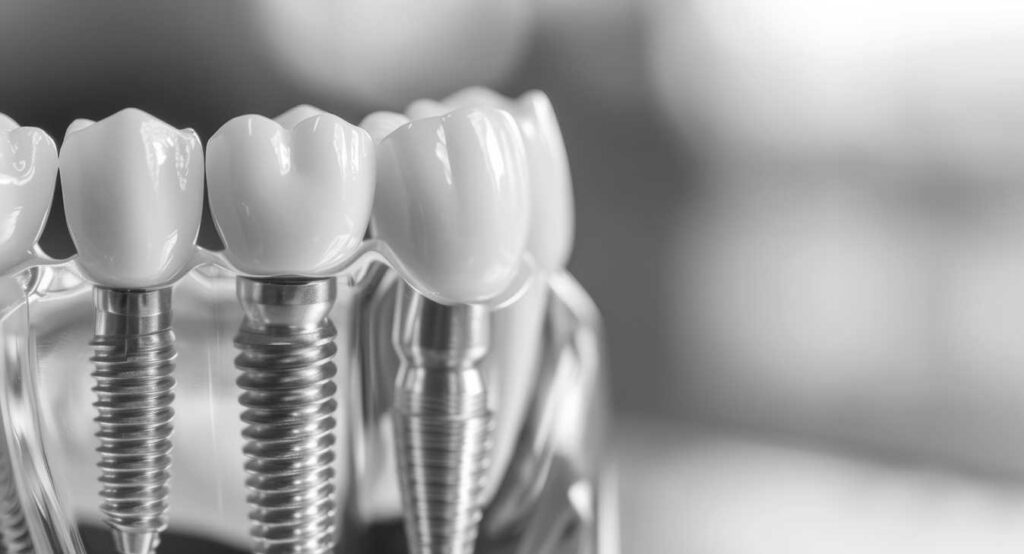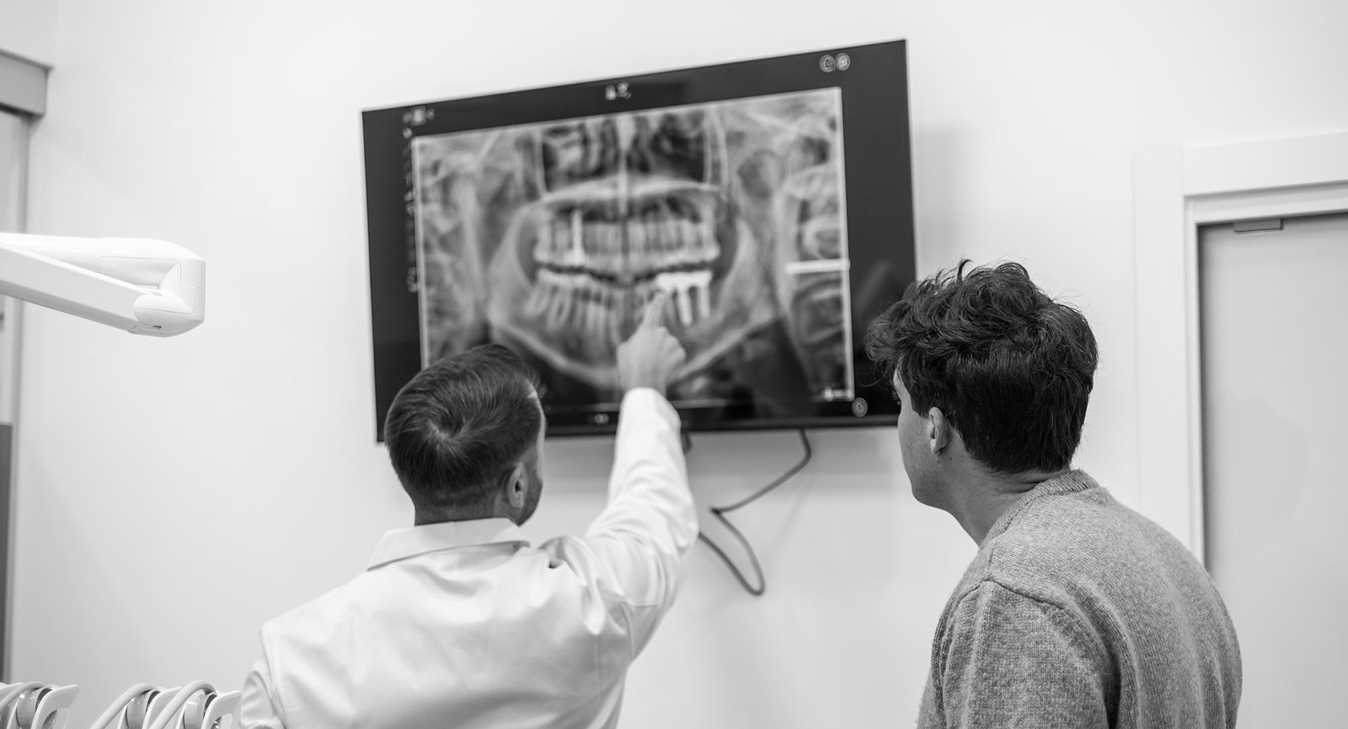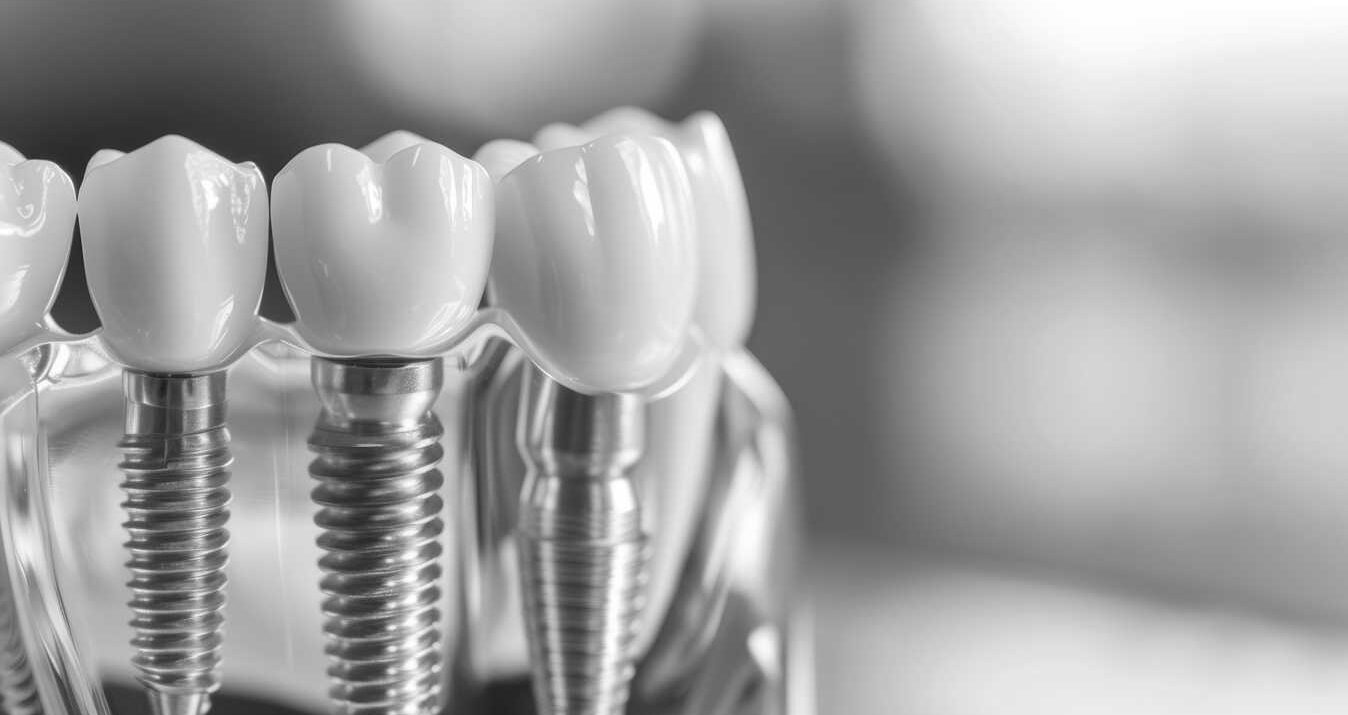What Are Dental Implants?
Dental implants are artificial tooth roots made from metal posts or frames surgically positioned into the jawbone beneath the gums. They provide a stable foundation for permanent or removable replacement teeth, such as crowns, bridges, or dentures, that function like natural teeth.
Dental Implants in Argentina.
On this page, you’ll find straightforward information about what it’s like to get dental implants abroad. We’ll explain what dental implants are, why some people consider having them placed in another country, and what’s good to keep in mind if you’re thinking about Argentina — from planning your trip to understanding what to expect at the clinic.
- Am I a Suitable Candidate
- Are Implants Abroad Cheap
- On What To Pay Attention


Are You a Good Candidate for Dental Implants?
Dental implants aren’t suitable for everyone. Good general health, healthy gums, and enough jawbone are often required. Conditions like diabetes may need to be well-managed, and avoiding smoking is often recommended. A licensed dentist will always carry out a full evaluation to determine if implants are right for you.
The Benefits of Dental Implants Abroad.
Many people choose to get dental implants abroad for a variety of reasons. In this section, we outline some of the main benefits to consider.
Cost Savings
Dental care in Argentina tends to be more affordable than in countries like the U.S. For treatments like implants, veneers, or crowns, the difference in cost can be noticeable — sometimes even around 50% less. This is mostly due to lower living and operating costs, not because of lower standards.
Many people who choose treatment in Argentina say they’ve found reliable care that feels both accessible and aligned with what they’d expect back home in terms of safety and professionalism.
High Quality Dental Care
Some clinics in Argentina work with modern tools like digital X-rays, CAD/CAM systems for crowns and implants, and even laser dentistry. These technologies can help make planning more precise and may support a smoother treatment process.
The clinics we connect with through Teeth Traveler often combine this kind of technology with experienced care — which can add clarity and comfort to your overall experience.
High-Skilled Dentists
Dental care in Argentina follows strict regulations designed to support safety and professional standards. Many of the clinics we work with through Teeth Traveler take time to uphold these — often choosing to space out their appointments so they can focus more on individual care.
If you’re thinking about getting dental implants abroad, that kind of approach can make the overall experience feel more thoughtful and reassuring.
Oral Care While Traveling
ome dental clinics in Argentina use advanced tools like digital X-rays, CAD/CAM systems for custom restorations, and laser dentistry. These can help make the planning more accurate and the treatment process a bit smoother.
The clinics we’re connected with at Teeth Traveler often combine this kind of technology with experienced care — which can make it easier to understand what’s happening and feel more at ease during your visit.
Shorter Waiting Times
Argentina’s dental care system follows strict regulations that aim to uphold safety and professional standards. Many of the clinics we’re connected with reflect this by focusing on quality over speed — often taking time between appointments to give each patient their full attention.
If you’re thinking about dental implants abroad, that kind of approach can help create a more thoughtful and reassuring treatment experience.
Personalized Dental Care
Dentists in Argentina are often appreciated not just for their skills, but for how personally they approach care. Many of the clinics we’re connected with take time to understand what matters to you — creating a treatment plan that fits your situation, from the first consultation through to follow-up.
That kind of one-on-one attention, combined with clear communication and a focus on comfort, can make the whole experience feel more supportive and reassuring.
Advanced Treatment Options
Getting dental care in Argentina also gives you the chance to experience more of the country. Cities like Buenos Aires and Mendoza have a lot to offer — from lively neighborhoods to local food and culture.
Many people find that combining treatment with travel turns the whole experience into something not just practical, but genuinely memorable.
All-Inclusive Packages
Argentina has become a popular choice for dental care abroad, especially for those looking for both quality and affordability. Many clinics offer care that meets international standards, often at a lower cost than in the U.S.
People who travel here often speak highly of their experience — not just the treatment itself, but the warm, welcoming environment they find along the way.
Procedure of Dental Implants.
If you’re thinking about getting dental implants abroad, it’s helpful to understand how the procedures usually follow international dental standards. Knowing what to expect can make the process feel more manageable. Watch the video to get a simple overview of how it typically works.
Steps Before, During and After Your Treatment.
Below we outlined in more detail what you can expect before, during and after getting dental implants in a foreign country like Argentina. From researching where to get your treatment to post-care consults.
Research and Choosing
Getting dental implants is a big step — and honestly, choosing the right clinic makes a huge difference. It’s not just about the result, but how comfortable and confident you feel along the way.
In Argentina, a lot of people are surprised to find that the quality of care can be very high, while the costs are much lower — often up to 50% less than in the U.S. That price difference mostly comes from lower day-to-day costs, not because the treatment is any less thorough.
Many clinics use advanced technology and reliable materials that are made to last. But just as important is how they treat you — taking time to explain things, answer your questions, and make sure you’re clear on what to expect.
If you’re curious, a lot of clinics we’re in touch with offer free online intake calls. It’s a simple, no-pressure way to talk things through and see if it feels right for you.
Before Your Treatment
Once you’ve chosen your dental clinic in Argentina, a bit of preparation can help everything go more smoothly.
Start by making sure the clinic has your full medical history, including any medications you’re currently taking. It’s also a good idea to double-check that your travel insurance covers medical procedures — just in case.
You’ll want to book flights and accommodation near the clinic for convenience, and think about how you’ll get around locally. Make sure to allow some time for recovery too — especially if your treatment spans a few days.
Before you go, confirm the details with your dentist: the steps of the procedure, how long it’s likely to take, and what the costs include. Taking care of these basics helps you feel more prepared and focused on the treatment itself — with a bit more peace of mind.
During Your Treatment
Once your dental implant treatment begins, it’s natural to have a few nerves — but feeling prepared can make all the difference.
Before surgery, follow any instructions your dentist gives you. That might include things like fasting, adjusting certain medications, or just making sure someone can accompany you if needed. During the procedure itself, your dental team will walk you through each step, so you always know what’s happening.
Afterward, take a moment to go over your aftercare instructions before you leave the clinic. This usually includes how to manage any discomfort, when to take your prescribed medication, and how to plan for follow-up visits.
Staying in touch with your clinic during the recovery period — even just to ask a quick question — helps everything stay on track and gives you a little extra peace of mind.
After Your Treatment
Recovery after dental implant surgery is an important part of the process — and giving yourself time to heal properly really matters.
Your dentist will give you specific post-op instructions, so try to follow them closely. This usually means taking any prescribed medication, eating soft foods for a few days, and keeping the area clean without disturbing the implant site.
It’s also a good idea to plan for a bit of downtime — rest up and avoid heavy activity while your body starts to heal. Make sure to attend your follow-up appointments, where your dentist will check how things are going and let you know when it’s time for the next step, like placing the crown or final restoration.
Being prepared and looking after yourself during recovery helps set the foundation for implants that stay strong and stable long-term.
Reviews of Patients.
Since 2013, clinics in our network have helped many patients with dental implants — each with their own story and needs. Below are a few examples of treatments they’ve carried out, giving you a glimpse into what real implant journeys can look like.






Dental Implant Packages.
Below you’ll find three fixed-price dental implant packages created by our network. These are indication prices, meant to give you a general idea of the costs.
If you’re planning more extensive work or want to add extra services, we’re happy to explore the options with you.
Instant_Implants
Treatment duration between 2-3 daysSame Day Treatment
*Estimated Price
-
Free Checkup & Cleaning
-
Implants by Straumann®
-
Online Care & Documents
-
Material Guarantee 🗹
Smile_Implants
Treatment duration between 2-3 daysSame Day Treatment
*Estimated Price
-
Instant_Implants
-
Professional Whitening
-
Care Instruction Plan
-
Material Guarantee 🗹
No Strings Attached
A Direct Agreement with The Dentist
Crown_Implants
Treatment duration between 2-3 daysSame Day Treatment
*Estimated Price
-
Smile_Implants
-
Temporary Crown
-
Follow-up Dentist at Home
-
Material Guarantee 🗹
No Strings Attached
A Direct Agreement with The Dentist
Cost of Dental Implants.
Argentina vs. US and CA.
Dental implant costs can differ widely between countries. Below is a common example — an implant with a crown. In Argentina, the total cost can be up to 60% lower than in the U.S., while still maintaining a high standard of care.
| Dental Implant Procedure | US & Canada | Argentina |
|---|---|---|
| Initial Consultation | $100-$200 | $50-$100 |
| Dental X-rays | $50-$200 | $20-$50 |
| CT Scan | $200-$600 | $100-$300 |
| Bone Grafting | $600-$2,500 | $300-$1,000 |
| Surgical Implant Placement | $1,500-$3,000 | $800-$1,500 |
| Abutment Placement | $500-$1,000 | $200-$500 |
| Crown Placement | $1,000-$2,500 | $500-$1,200 |
| Post-Operative Care | $100-$300 | $50-$150 |
| Total Costs of One Dental Implant | $4,050-$12,300 | $2,020-$4,800 |
Plan an Intake.
Online. For Free.
If you’d like to learn more about how our associated dentists approach dental implant treatments, feel free to schedule a free online intake. It’s a simple way to explore your own needs and ask any questions you may have.
Additional Important Topics When Getting
Dental Implants Abroad.
Once you’ve decided to move forward with dental implants abroad, there are a few important things to keep in mind about the treatment process.
Materials for Dental Implants
When looking into dental implants, you’ll notice that titanium is one of the most commonly used materials. It’s known for being strong and well-tolerated by the body, which makes it a solid foundation for replacement teeth. Some clinics also offer zirconia implants — a metal-free alternative that some patients prefer. Both options meet international standards and are designed to be safe, stable, and long-lasting.
Dental Implants Techniques
Modern dental implant techniques — like computer-guided surgery — help make the process more precise and often more comfortable. Whether you’re getting a single implant or something more extensive like an All-on-4 restoration, these methods can support a better fit and an easier recovery.
The key is that the treatment is tailored to your specific needs, which helps set the stage for the best possible outcome.
Treatment Complications
While dental implants are generally considered a safe treatment, like any procedure, there are some risks to be aware of — such as infection or implant failure. Clinics reduce these risks by doing careful pre-treatment assessments and keeping a clean, sterile environment throughout the process.
It also helps to know that a good aftercare plan is in place. That way, if anything unexpected comes up, it can be addressed quickly and professionally — giving you a bit more peace of mind.
Hidden Treatment Costs
It’s important to have a clear understanding of the costs before starting dental implant treatment abroad. Look for clinics that are upfront about their pricing and avoid any hidden fees.
Some offer all-inclusive packages that cover everything from consultations and x-rays to the surgery and follow-up visits — which can help you plan more confidently. Always ask for a detailed cost breakdown so you know exactly what’s included and what to expect.
Safety and Dental Hygiene
Your safety and hygiene matter at every stage of a dental procedure. Reputable clinics follow strict sterilization protocols and use modern equipment to maintain a high standard of care.
It’s also worth looking for clinics with international accreditations and experienced staff — these are good signs that your treatment will be handled with professionalism and attention to detail.
Proven Results of a Clinic
When exploring clinics, it’s helpful to look at their experience with dental implant treatments. Things like case examples or before-and-after photos can give you a clearer picture of the work they’ve done and what’s possible.
Seeing how they’ve helped others can make it easier to trust that you’ll be in capable hands — and give you a bit more confidence as you plan your own treatment.
A Clinics Patient Reviews
Reading patient reviews can be a helpful way to get a feel for a clinic. They often give honest insights into what others experienced — from how the dental team communicates to how comfortable they felt during and after treatment.
Hearing real stories from real people can help you make a more informed decision — and feel more confident about the clinic you choose.

Step-by-Step Guide for Dental Work in Argentina.
Getting dental implants abroad involves a few important steps to help ensure a safe and smooth experience. We’ve put together a step-by-step guide to walk you through what to consider before, during, and after your treatment.
How to Choose a Clinic for Dental Implants in Argentina.
When interested in getting dental implants abroad, there are a lot of choices in different clinics. Read our section in which we shed more light on this topic and how to choose.
A Guide
To Choose Dental
Clinics Abroad
Why Argentina?
Countries like Mexico, Costa Rica, Colombia, and Argentina all offer affordable dental care. While some destinations attract high volumes of medical tourism, this can sometimes affect how personal the care feels.
Argentina tends to offer a more relaxed, patient-focused approach — with clinics that often take more time for each individual. If you’re considering it and have questions, feel free to message us on WhatsApp.
Topics When Choosing a Clinic.
Doing thorough research is essential when choosing a dental clinic abroad for implants or related treatments. Since dental implants often involve surgical procedures, it’s important to make sure you’re in the care of accredited and qualified professionals who meet high standards.
- Check Online Reviews
- Verify Accreditations
- Always Schedule an Online Call
- When Its Very Cheap, Be Cautious
Frequently Asked Questions (FAQs) on Dental Implants Abroad.
Aside from the information above, we daily receive common questions about getting dental implants overseas.
Which country is the cheapest and safest for dental implants?
Several countries offer a combination of affordable pricing and quality dental implant care. Here’s a brief overview:
Argentina: Known for its skilled professionals and modern clinics, Argentina offers high-quality care at significantly lower prices than in the U.S. It’s also recognized for its more personalized, patient-focused approach.
Mexico: Popular for its convenience and proximity to the U.S., Mexico offers many well-established dental clinics catering to international patients seeking lower-cost treatments.
Costa Rica: With a strong reputation for medical tourism, Costa Rica combines cost-effective care with internationally trained dentists and well-regulated standards.
Turkey: A growing hub for dental tourism in Europe, Turkey is known for its advanced clinics, competitive pricing, and hospitality for international patients.
Hungary: Especially popular with European travelers, Hungary offers extensive experience in implant dentistry and clinics that focus on high-quality, affordable care.
Thailand: With a long-standing medical tourism industry, Thailand offers modern dental facilities and some of the most competitive prices in Asia, particularly in major cities like Bangkok.
Should I get dental implants abroad?
Getting dental implants in countries like Argentina or Mexico can be significantly more affordable than in the U.S. Many people choose to travel for treatment based on cost, quality, and the availability of modern clinics. Still, it’s important to research clinics carefully, understand the potential risks, and account for travel and aftercare when planning.
Where is the cheapest place to get all on 4 dental implants in the world?
Countries such as Mexico and Argentina are often considered cost-effective options for All-on-4 dental implants. Argentina is convenient for North American patients, offering high-quality care at lower prices for those willing to explore as well its culture and astonashing nature.
What is the best dental implant in the world?
Straumann®, a Swiss company, is widely recognized for producing high-quality dental implants. Its products are known for precision engineering and long-term performance, and are used by dental professionals in many countries.
Who is not a good candidate for dental implants?
People with uncontrolled diabetes, untreated gum disease, or insufficient jawbone may not be ideal candidates for implants. Other health conditions — such as autoimmune disorders or ongoing treatments like radiation therapy — can also influence suitability. A thorough evaluation by a dentist is needed to determine the best option.
How long does the dental implant process take?
The full process usually takes 6 to 9 months. This includes healing time after implant placement and before the final crown is added. The exact timeline depends on factors like bone quality, the need for grafting, and how many implants are placed.
Can your body reject metal implants years later?
Yes, although rare, the body can reject metal implants due to sensitivity or an immune response. This may cause discomfort, swelling, or loosening of the implant. Regular dental check-ups help detect issues early and ensure implant health over time.
What is the life expectancy of a dental implant?
The life expectancy of a dental implant is typically 20 to 30 years or longer with proper care. Factors influencing longevity include the patient’s oral hygiene, lifestyle habits, and regular dental check-ups. Implants can last a lifetime if the surrounding bone and gums remain healthy, emphasizing the importance of maintaining excellent periodontal health.
What is the most expensive part of a dental implant?
The crown — the visible part of the dental implant — is usually the most expensive component. It’s custom-made to match your natural teeth in shape and color, which makes it more costly than the titanium post placed in the jaw.
Ask Your Question
At Teeth Traveler, we’re here to share helpful information — not to offer medical advice. This information on this page is for general informational purposes only and does not constitute medical advice, diagnosis, or treatment. Teeth Traveler is not a healthcare provider and does not offer medical services. The clinics listed on our platform operate independently and are responsible for the care they provide. While we aim to offer helpful guidance, readers are encouraged to consult directly with licensed dental professionals before making healthcare decisions or pursuing treatment abroad. No rights may be derived from the information provided on this page. For more details, check our disclaimer and terms of use.

